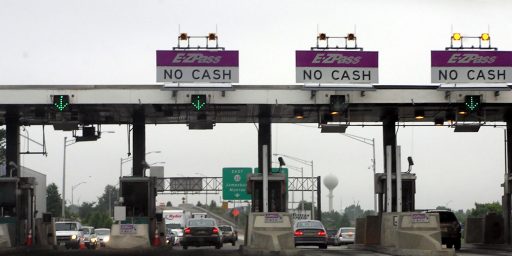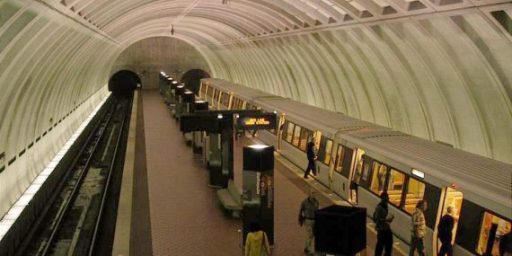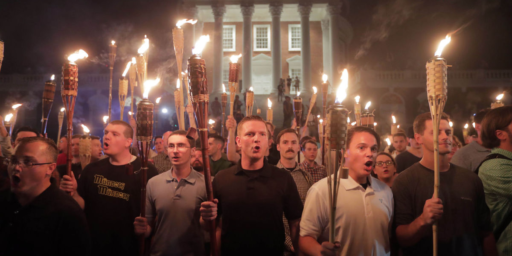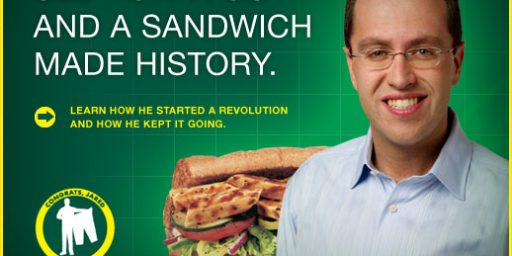KINSLEY ON TRAFFIC
Michael Kinsley asks an interesting question: Should you be allowed to buy a faster commute? Strangely, he provides no answer to his question. Or even much in the way of information to help the reader decide for himself.
Having moved within the past few months from an area with virtually no traffic to a rather congested one, I find the question interesting. Even though I live and work about 40 miles from the District of Columbia, the area is quickly getting caught up in the traffic problem of the Metro area. Unlike residents of DC and the near suburbs, the Metro subway system is also not an option. The major highways are very congested and getting more conjected by the day; the county I live in (Loudoun Co., VA) is one of the fastest growing in the US and has gone from mainly farmland to a DC “exurb” in less than a decade.
Thousands of people pay what strikes me as exorbitant tolls to travel on the Dulles Greenway in order to escape the main roads and, ironically, the Greenway itself succumbs to traffic jams on a fairly regular basis. Is it fair that the relatively wealthy get to pay to bypass the traffic that the poor must sit in? I suppose it’s not. Still, were it not for the tolls, the Greenway likely wouldn’t have been built. Those cars would have to go somewhere. So, while eliminating the toll road would make life worse for the rich, it wouldn’t do anything to make life better for the poor; indeed, it would make things slightly worse for them.
I’m not sure what the “fair” alternative would be. Certainly, this area has the prerequisite traffic and population density to make public transportation desireable. But someone has to pay for that, too. If it is paid for by gas or other general taxes, the costs will be borne by riders and non-riders alike. Or it could be financed by a bond issue and then paid by increased fares for riders. Of course, that would make it more expensive to ride the subway and thus impact the poor. . .
I’m starting to see why Kinsley didn’t answer his question.






A hundred years ago rich people bought automobiles to go faster while others walked, used mass transit or rode horses. Some people fly in private jets instead of Cessna 152s. If a super-duper fly-ur-self commutemobile came out costing $100,000, some people would buy one and get around faster, others wouldn’t. So… why would paying more to get better road access be unfair?
I would agree there’d be a problem if everyone had to pay to get around, but this is a different question entirely.
Strange that they’re having traffic jams on a toll road. They’re clearly not charging enough for fares–supply and demand, after all.
Ultimately the whole traffic thing will be solved with much more comprehensive mass transit. (A lot of people cringe whenver the “mass transit” option is mentioned; consider that if most people used and paid for mass transit, it would actually be useful for most people.) As the population increases cars are showing themselves to be increasingly nonviable for day-to-day transportation, especially when everyone is at point A and really really wants to get to point B. Building more roads also becomes impractical.
Maybe we’ll get the u-fly-urself technology breakthrough and the gyrocars of the future will become reality, but I’m not betting on it. I suspect teleportation will happen first…
Most of the time, there aren’t traffic jams on the toll road. But there are accidents, weather problems and, strangely, “sun delays.” And partly it’s just a function that traffic keeps growing at a phenomenal rate since, not only was the population already exploding outward in order to find affordable housing, but the toll road actually incentivized that behavior since it shortened commuting time.
I have no problem with mass transit, but it only works when there is very high population density. Even with traffic being what it is, it wouldn’t make sense for me to take Metro to DC from, say, the Dulles Airport even if it existed. It would take two hours to make the trip by subway, with its constant stops. Other than rush hour, I can still get there faster by car.
I live in Loudoun Co as well and commute to Alexandria. I am fortunate to have free parking in our garage. If I had to pay for parking I might consider taking Metro. But it would take about 30 minutes longer than the average drive and it would take be about 40 minutes just to get to the nearest Metro station. So for me, driving is the better option – and it costs less as well.
I don’t know what the solution to the DC traffic problem is. They can’t build new roads fast enough and the population continues to explode. It’s a weird thing.
Oh, and those “sun delays” are killer – I prefer traffic on a rainy day.
I hate to say these 2 ugly words- private roads. OK, actually, I love having a chance to say them. It seems perfectly obvious to me that privatizing roadways would be a massive boon to all. You think corporate America wouldn’t be able to find a way to improve the situation? AND, if you are an inner-city type who doesn’t have much use for cars and roads to begin with, then it’s a huge bonanza of tax cuts for you. So long, highway taxes. It was nice knowing you.
Of course, I’m talking pipe dreams here. America’s collective psyche has been so beaten down by what it already knows, that it is really afraid of change. The average reaction I get to this proposal is the person recoiling instinctively in terror. But, seriously…what would be so bad about it?
It’s not an issue I’ve studied. But how would private companies get the land? They don’t have eminent domain. If they had to buy it through negotiations, a couple of people would hold out to get a huge windfall. That cost would have to be passed on.
It’s obviously all but impossible now. It would be akin to converting the Soviet Union to capitalism over night. Which is one big reason why I hate government intervention: eventually, it becomes so ingrained that people simply cannot even fathom it being another way.
Having said that, some states have privatized the maintenance of some highways. And, clearly, some private roads DO exist. I would imagine if this were ever seriously undertaken, the companies would have to bid for ownership of the roads. Just imagine it now: luxury lanes for the affluent. Bargain lanes for the thrifty. It would be like every other business. Beautifully accomodating of all it’s customers.
—